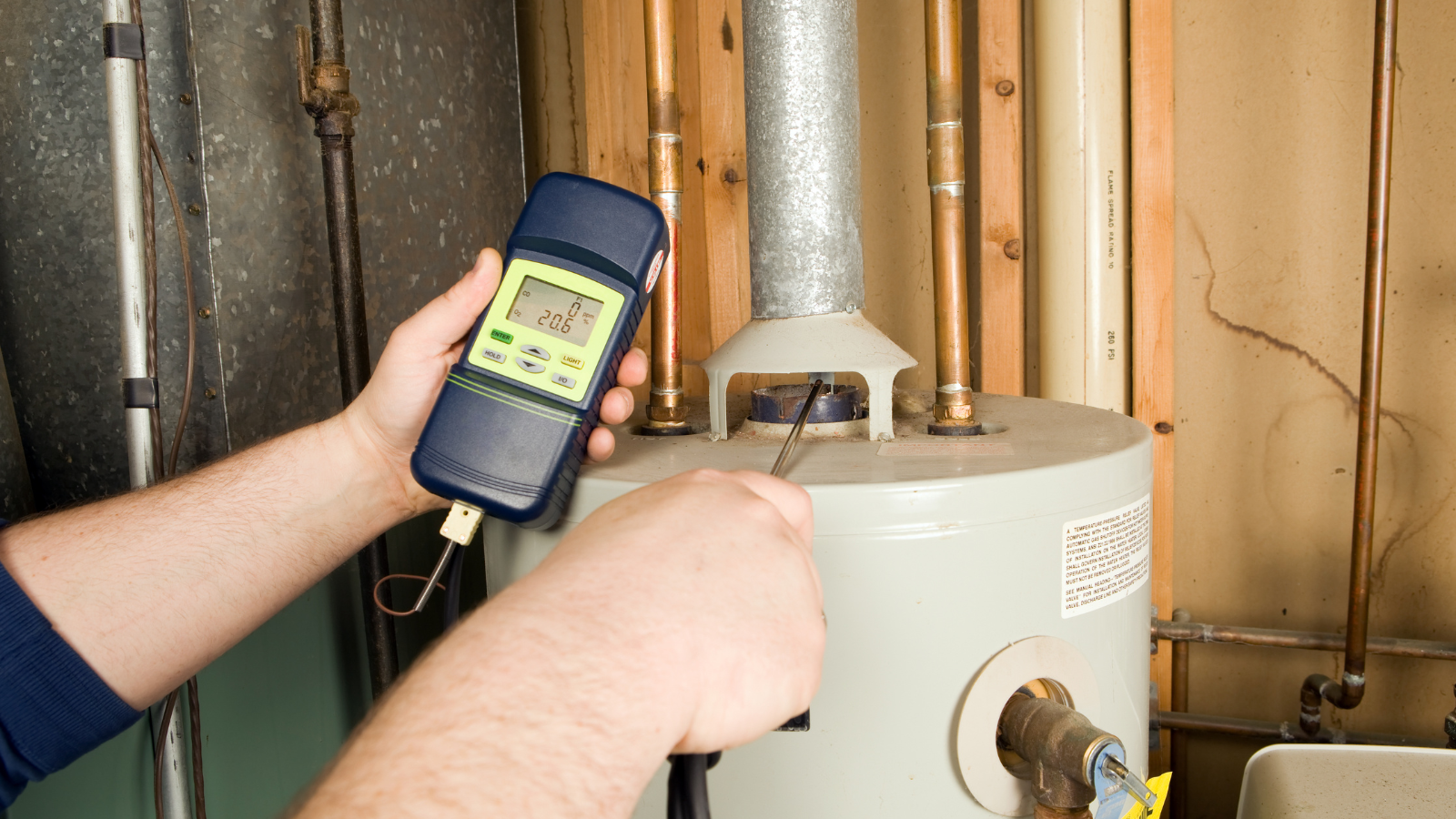Key Takeaway:
- When selecting a water heater, it’s essential to weigh factors like energy efficiency, initial investment, long-term operating costs, space constraints, and your household’s specific hot water needs.
- Tankless water heaters are known for their energy savings, while traditional storage tanks offer a more budget-friendly upfront cost.
- Eco-conscious homeowners may opt for heat pump or solar water heaters, which have higher installation costs but offer substantial long-term savings and environmental benefits.
What Type of Water Heater is Most Energy Efficient?
The most energy-efficient choice is the tankless water heater. Unlike traditional water heaters, which constantly heat and store water, tankless models work on an “on-demand” basis, heating water only when it’s needed. This eliminates standby heat loss—one of the biggest sources of energy waste in traditional models—leading to decrease carbon emissions and energy costs. to reduce carbon emissions and utility expenses. Additionally, tankless systems provide a They are perfect for homes that require a steady supply of hot water since they want to maximize energy efficiency without compromising comfort.
Passaic, NJ, homeowners know to call CBJ Plumbers for all their plumbing needs—be smart, choose the best!
The Pros and Cons of Different Types of Water Heaters
1. Storage Tank Water Heater
Pros:
- Lower upfront cost: One of the most affordable options to purchase and install.
- Easy to install: Requires minimal home modifications.
- Reliable hot water supply: Stores large volumes of hot water, which is perfect for households with high water usage.
Cons:
- Less energy efficient: Suffers from standby heat loss as the water is continually heated and reheated.
- Larger footprint: Requires more space for both the tank and the connections.
- Shorter lifespan: Typically lasts 10–15 years before needing replacement.
2. Tankless Water Heater
Pros:
- High energy efficiency: Heats water only when needed, reducing energy waste.
- Endless hot water: Provides continuous hot water as long as the demand doesn’t exceed capacity.
- Compact size: Space-saving design, ideal for homes with limited storage space.
Cons:
- Higher upfront cost: Installation and purchase costs are higher, although long-term savings can offset this.
- Simultaneous demand issues: May struggle to supply hot water to multiple fixtures at once if capacity is exceeded.
- Maintenance requirements: Needs regular descaling, especially in areas with hard water.
3. Heat Pump Water Heater (Hybrid)
Pros:
- Extremely energy efficient: Can reduce energy consumption by up to 60% by transferring heat from the surrounding air.
- Longer lifespan: Typically lasts 15–20 years, offering better longevity than traditional models.
- Lower operating costs: Though the initial investment is higher, the energy savings over time are substantial.
Cons:
- High upfront cost: More expensive to install, and may need a specific location for optimal performance.
- Climate-dependent: Performs less efficiently in colder climates where there is less ambient heat to draw from.
- Space requirement: Requires sufficient space for airflow and proper installation.
4. Solar Water Heater
Pros:
- Eco-friendly: Utilizes renewable energy from the sun, significantly lowering both energy bills and your carbon footprint.
- Ideal for sunny climates: Performs exceptionally well in regions with ample sunlight throughout the year.
Cons:
- High installation cost: Requires investment in solar panels and storage systems, making it the most expensive option initially.
- Weather-dependent: Cloudy or rainy days reduce efficiency, often necessitating a backup heating system.
- Regular maintenance: Solar panels and other system components need periodic inspection and maintenance to remain efficient.
5. Condensing Water Heater
Pros:
- Highly efficient for gas-powered homes: Uses waste heat from exhaust gases to preheat incoming water, maximizing energy efficiency.
- Lower long-term costs: More efficient than conventional gas heaters, resulting in reduced utility bills over time.
Cons:
- Higher upfront cost: More expensive than traditional gas-powered models.
- Requires more space: These units are bulkier and need additional room for venting and installation.
- Limited to gas-powered homes: Only feasible for homes with access to natural gas.
Ensure your water heater runs efficiently and avoids unexpected breakdowns. Here are checklist now and keep your home warm and comfortable all season long
How to Choose Between Different Types of Water Heater
1. Water Usage:
Evaluate your household’s hot water demand. For families with high water usage, a storage tank might be more suitable. Smaller homes or households with moderate water needs might benefit more from a tankless model.
2. Climate:
If you live in a warm region, a heat pump water heater could provide excellent efficiency. Solar water heaters are best suited for sunny climates. In colder regions, tankless or traditional storage water heaters may offer better performance.
3. Space Availability:
If space is limited, consider a tankless or condensing water heater, which are both compact and space-efficient. If your home has more space, a larger storage tank or a heat pump system may be feasible options.
4. Energy Efficiency Goals:
If reducing energy consumption is a priority, Water heaters that are solar, heat pump, and tankless are all excellent choices. While these systems have higher upfront costs, their long-term energy savings can be significant.
5. Budget:
It’s important to balance the initial purchase cost with long-term operating expenses. Storage tanks are the cheapest to install but tend to have higher ongoing energy costs. Tankless, heat pump, and solar systems come with a higher price tag but are more economical in the long run due to their energy-saving potential.
Final Thoughts
Choosing the right water heater for your home requires a careful balance of initial costs, long-term savings, available space, and energy efficiency goals. By assessing your household’s hot water needs and your commitment to sustainability, You are able to make an educated choice that fits both your financial situation and your long-term performance expectations.





